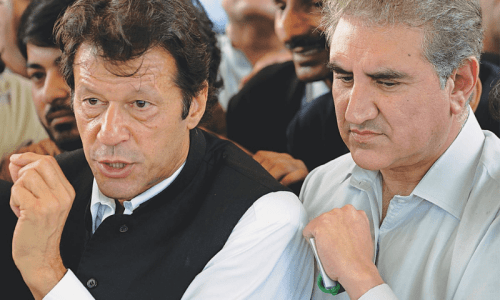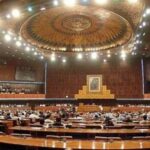ISLAMABAD: On Wednesday, the Islamabad High Court (IHC) deemed the appeals of former foreign minister Shah Mahmood Qureshi and former prime minister Imran Khan against their convictions in the cipher case maintainable. The IHC also asked the prosecution and defense attorneys to present their case starting on Monday.
The appeals against Mr. Khan and Mr. Qureshi’s convictions and 10-year sentences each in the cipher case were once again heard by an IHC division bench made up of Chief Justice Aamer Farooq and Justice Miangul Hassan Aurangzeb.
Special prosecutor Hamid Ali Shah objected to the maintainability of Mr. Khan and Mr. Qureshi’s appeals during the prior hearing.
Mr. Shah drew attention to the fact that the Official Secrets Act, which was passed in 1923, did not grant the right of appeal outside of the trial process.
He contended that since the trial court had found the two leaders guilty and the right of appeal was not stipulated, the conviction ought to be considered final.
Mr. Khan’s attorney, Barrister Salman Safdar, countered that the court would consider this as a case of first impression if the statute did not grant the opportunity to appeal a conviction.
According to him, the legislation that was applied in the prosecution of the espionage suspects resulted in the conviction of the former foreign minister and prime minister.
Mr. Safdar maintained that the Criminal Law (Amendment) Act, 1976 established that the Supreme Court would be the forum of appeal, notwithstanding the fact that the higher courts had found in multiple cases that the convict could not be left without a remedy.
After determining that the appeals may be sustained, the bench chose to consider the case on its merits.
Imran worries about bribery
In the meantime, Imran Khan pledged to file a Supreme Court complaint against the purported election manipulation in the general elections and expressed worries about possible horse-trading in the approaching Senate elections.
Speaking to the media following a hearing in the £190 million corruption reference, in which Mr. Khan and his spouse, Bushra Bibi, are on trial before the accountability court of Islamabad, the former premier declared that votes from members of parliament would be bought in the next upper house election.
He stated that the elections tarnished the institutions’ reputations and were fraudulent.
He claimed that despite the PTI’s inability to conduct its campaign, the electorate responded by casting ballots. But the people’s mandate was taken, he claimed, rather than respected.
Mr. Khan issued a warning, stating that Pakistan will encounter the same predicament as Sri Lanka following its default and that the PTI would carry on with nonviolent protests against the “rigged elections.”
A court case involving accountability
Judge Nasir Javed Rana of Accountability recorded the testimony of three witnesses at the £190 million corruption case hearing. The next hearing is scheduled for March 16.
The following individuals have been listed as accused in this reference: Mr. Khan, Bushra Bibi, property tycoon Malik Riaz, his son Ahmed Ali Riaz, former accountability czar Mirza Shahzad Akbar, Farhat Shahzadi (also known as Farah Khan), and Zulfi Bukhari. All of the others—aside from Mr. Khan and Bushra Bibi—have been labeled proclaimed offenders.








